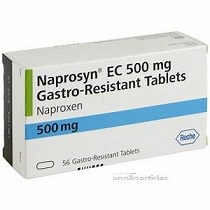Naprosyn (Naproxen) Canada
Description
Naprosyn is often prescribed by doctors to relieve pain caused by different medical conditions, including muscle aches, headaches, dental pain, tendonitis and menstrual cramps.
Recommendations
 Those patients who suffer from joint stiffness, swelling and pain as a result of bursitis, arthritis and gout attacks should give it a try too. This medication belongs to HSAIDs, and it works by blocking the body production of specific natural chemicals that are responsible for inflammation. Its intake is beneficial to treat inflammation, fever, moderate pain, osteoarthritis, menstrual periods, etc. As a patient, you need to take Naprosyn orally, 2-3 times a day, with a glass of water and according to the recommendations of your doctor. Make sure that you don’t lie down for ten minutes after taking this medication and use it with milk or food if you want to prevent upset stomach.
Those patients who suffer from joint stiffness, swelling and pain as a result of bursitis, arthritis and gout attacks should give it a try too. This medication belongs to HSAIDs, and it works by blocking the body production of specific natural chemicals that are responsible for inflammation. Its intake is beneficial to treat inflammation, fever, moderate pain, osteoarthritis, menstrual periods, etc. As a patient, you need to take Naprosyn orally, 2-3 times a day, with a glass of water and according to the recommendations of your doctor. Make sure that you don’t lie down for ten minutes after taking this medication and use it with milk or food if you want to prevent upset stomach.
Precautions
Before you take Naprosyn, you need to tell your physician everything about allergic reactions and use of other meds, especially when it comes to NSAIDs and aspirin. Your doctor should know your entire medical history, especially if you have breathing difficulties, including asthma, blood disorders, heart problems, hypertension, stroke, liver complications, ulcers and others.
Keep in mind that the intake of Naprosyn may result in certain kidney problems, especially if you’re dehydrated, so be sure to drink a lot of water while undergoing this treatment. This medication can make you feel drowsy or dizzy, so don’t drive a car, use machinery or do other activities that require your full alertness to be on a safe side. Besides, its intake may result in stomach bleeding, especially when combining it with smoking and drinking alcohol. That’s why you need to limit alcohol and avoid other harmful habits. Naprosyn may make some patients more sensitive to direct sunlight, so it’s advisable to avoid any prolonged sun exposure. For lactating and pregnant women, you shouldn’t start using this medication.
Drug Interactions
They may change the way Naprosyn works and increase the risk of having serious adverse effects. That’s why you need to inform your doctor about any other meds and supplements that you’re taking at the moment. Remember that Naprosyn may interact with such medications as ACE inhibitors (Lisinopril and others), Aliskiren, corticosteroids, diuretics, etc. Its intake may also result in an increased risk of bleeding if you combine it with those medications that cause bleeding too. As an example, you should avoid combining Naprosyn with blood thinners and anti-platelet meds. Be sure to check all product labels attentively because many meds contain fever reducers and pain killers, including NSAIDs and Aspirin. Their mechanism of action is quite similar to the one of Naprosyn, so that their use will increase the risk of experiencing unwanted side effects. Finally, this medication may affect the results of your lab tests.
Side Effects
Naprosyn is associated with a list of certain adverse effects, just like other drugs, and the most common ones include headaches, drowsiness, nausea, rash, diarrhea, ringing in ears, heartburn, constipation, breathing difficulties, dizziness, abdominal pain and so on. The good news is that most of them are mild and pass fast. There are other serious adverse effects that a few patients may experience in quite rare cases, and they include blood clots, high blood pressure, heart failures, fluid retention and even heart attacks. Talk to your doctor to discuss the main risks and benefits involved.

